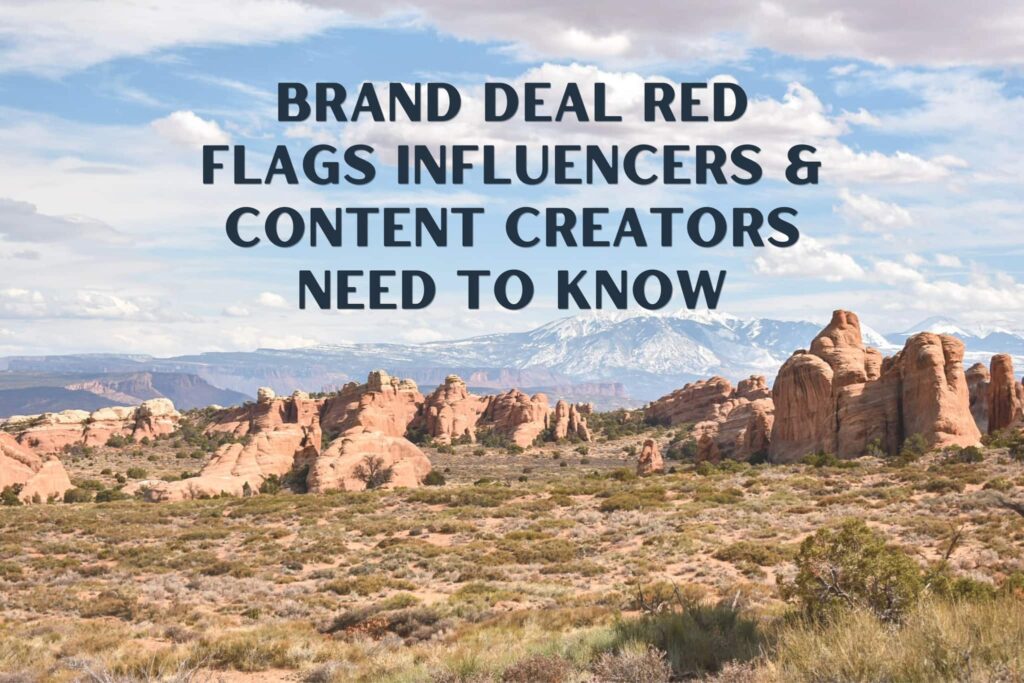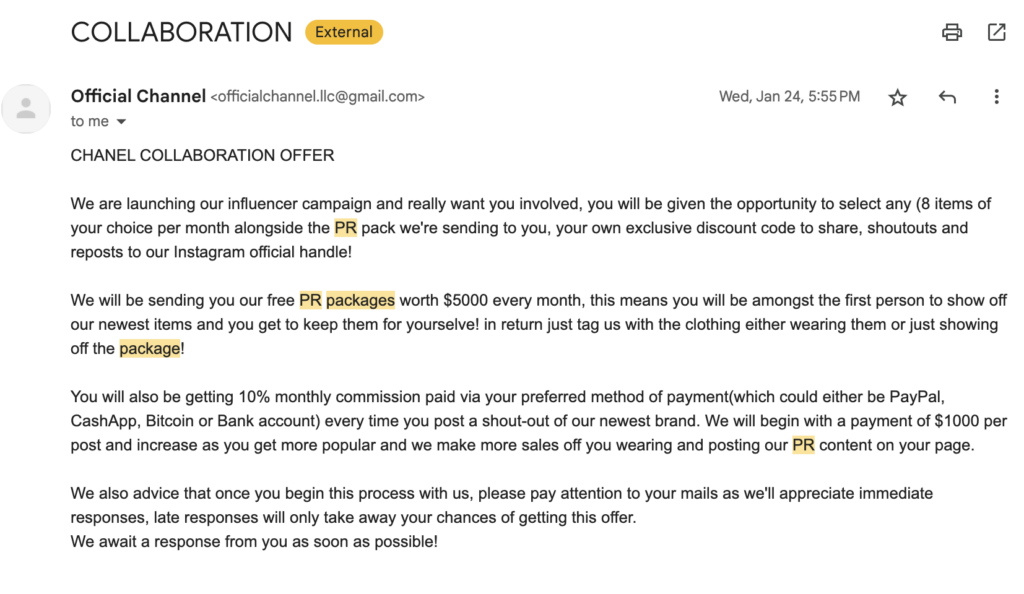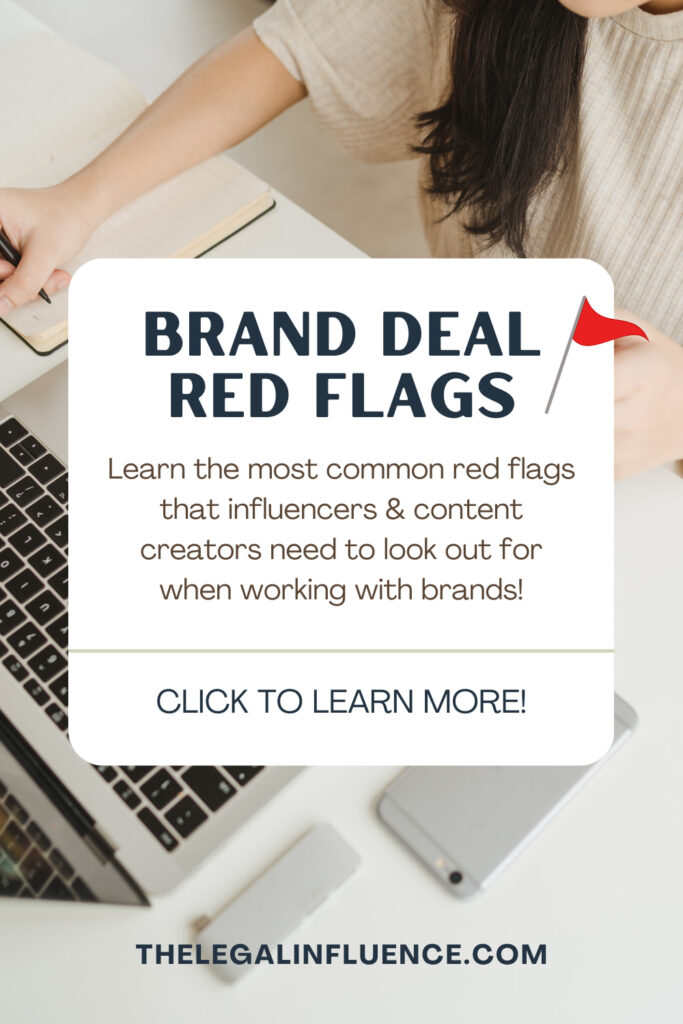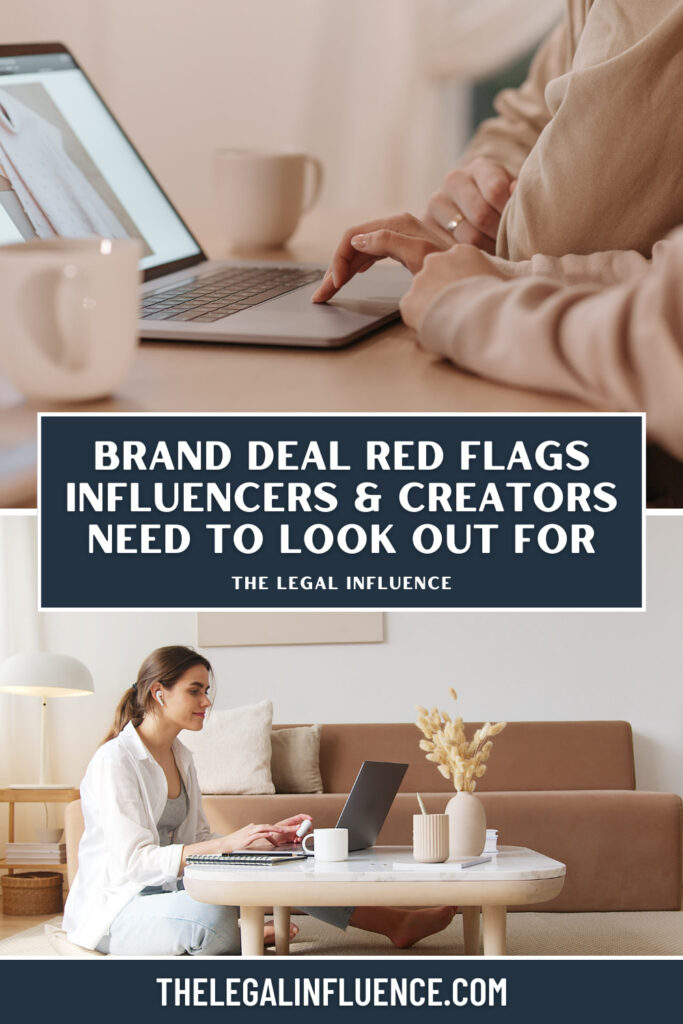If you’re an influencer or content creator, you probably get in-bound brand deal offers in your inbox daily. While some of these offers may lead to your dream brand deal, most of them are probably either bad offers or outright scams. This post shares some of the most common brand deal red flags influencers and creators need to watch out for when brands come knocking on your door.
While there are plenty of legit brand deal opportunities out there, the explosion of new content creators and UGC creators in recent years have attracted scammers looking to take advantage of people. It’s important for influencers and content creators to be able to recognize common red flags that pop up in outreach emails and during the course of a brand deal that indicate that an “offer” is actually a scam in disguise.

Inbound Brand Deal Offer Email Red Flags
The first few red flags I’m going to share have to deal with inbound brand deal offer emails. This is when a brand sends an email to a creator letting them know they want to work together, but the email isn’t actually coming from the brand.
Here are the most common brand deal outreach email red flags to keep an eye out for:
1. Fake Outreach Emails
Picture this: you receive an email from a DREAM brand, but as you read through the email things just sound too good to be true. Before you respond or click any links, take a closer look at the sender’s email address. Legitimate brands own their domains. They typically don’t use generic Gmail or Yahoo email addresses.
If the email looks something like BRAND_partnerships@gmail.com, then it is likely NOT actually coming from the brand. If the brand is reaching out directly the email address would look more like name@BRAND.com.
2. Lack of Personalization
Have you ever received an email from a brand that sounds like it was copy & pasted to a hundred other creators? That’s because it probably was! Authentic brand deal requests are going to be addressed and personalized to you. If an outreach email sounds super generic and spammy, and there isn’t really any information about the campaign or product they want you to promote, it’s likely not a legitimate offer.
Now there can be situations where a brand or PR company reaches out to a large number of creators at one time for a campaign. These emails are typically addressed directly to individual creators, but may not have a lot of personalization throughout the body of the email. In this situation, the body of the email typically contains details about the campaign and possibly a campaign brief, which often indicates it’s a legitimate opportunity.
3. Poor Grammar and Communication
While occasional grammatical or spelling errors may not indicate an offer is a scam, if an email is riddled with errors or feels like it was written by AI rather than a human, it’s likely not a genuine opportunity.
You may also notice that these types of emails also use a variety of different fonts in different sizes throughout the email. Random words might also be capitalized. These are all signs that the email is spam.
Brand Deal Red Flags: Common Email Scam
I want to talk about a really common email scam that creators and influencers see on a regular basis. In this situation a very well known brand “reaches out” to a creator offering them a monthly package with numerous items and big payments in exchange for minimal content deliverables.
This offer sounds way too good to be true and that’s because it’s not a legitimate offer from the brand, it’s a scam. These outreach emails typically hit all of the big three brand deal outreach email red flags I just discussed. They’re from a Gmail address. The offer is very generic and too good to be true. There’s no personalization. And there are spelling and grammatical issues that don’t make sense.
If you see an offer like this, do not respond or click any links!

Other Brand Deal Red Flags Influencers & Content Creators Need to Look Out For
The next batch of red flags are things to look out for once you’ve entered into the negotiation phase of the brand deal. The initial offer email may pass the sniff test, but that doesn’t necessarily mean you’re totally in the clear. These red flags are indications that a brand deal may not be legitimate or worthwhile opportunity.
1. Weird Brand Websites
Before committing to a brand partnership, thoroughly vet the brand’s website and social media presence to make sure it’s a legit company that you want to do business with. Especially if it’s a brand that you have never heard of. If something feels weird or off about the brand’s website or social channels that could be a big red flag.
Does the brand have a legitimate social media following or does it look like they bought followers? Are they using generic stock photos or videos? Have they worked with other content creators before (tip: check the posts the brand is tagged in)?
If it doesn’t seem like a legit brand it could just be a drop shipping company selling cheaply made products. While this isn’t necessarily a scam, it might not be the type of brand you want to do business with as a creator.

2. Being Asked to Pay For Shipping and/or Products
If a brand asks you to purchase their product at a discount or cover shipping costs, proceed with caution. When brands send these types of requests, they are really trying to turn you into a customer, while also getting free content from you. In some cases, these types of requests are actually scams to get financial information from you.
With that said, there may be unique situations where you need to purchase a product for a campaign. I’ve personally worked on a couple of influencer campaigns with large brands where I’ve needed to purchase low-cost products as part of the campaign. However, the circumstances were unique, I was reimbursed for the product, and I had already vetted the brand and PR company I was working with before agreeing to it. Outside of rare circumstances, a brand should be sending you anything you need to create the content you’re responsible for during a campaign.
3. Questionable Affiliate Programs
An increasingly common scheme that brands are engaging in is disguising affiliate programs as brand partnerships. Now, affiliate programs can be a lucrative income stream for creators, but not all programs are created equal.
When it comes to sharing affiliate links, you should have the freedom to share those links on your own volition. If you’re posting your outfit on Instagram stories or linking to products in your blog, and people are purchasing based on your recommendations, that’s a great opportunity to share a link. There are a lot of great affiliate platforms out there that give creators access to links from a large variety of brands.
However, some brands are starting to structure their affiliate programs to require creators to provide content deliverables, often with usage rights for the brand, in order to participate. Sometimes these brands also send products to creators, but the only payment comes in the form of affiliate commission. Creators should always be compensated fairly for the use of their content, and affiliate commission does not provide that.
Also remember, any time that you share an affiliate link you need to provide a proper FTC disclosure!
4. Refusing to Sign a Contract
It’s incredibly important to always have a contract when working with brands. If a brand refuses to sign a contract, that is a huge red flag. It indicates that the brand is not operating professionally and that they may have ulterior motives.
Oftentimes the brand is going to provide the contract with terms specific to a particular campaign. If the brand doesn’t have a contract available, you can provide your own contract as an influencer or content creator. Check out our Influencer Agreement and Content Creator Contract templates if you need your own attorney-drafted brand deal contract.

These are the most common brand deal red flags that influencers and content creators need to look out for. Ultimately, it’s important to trust your gut when it comes to accepting offers and working with brands. If something feels off or sounds too good to be true, listen to your intuition!
Listen to The Legal Influence Podcast Episode 005: Brand Deal Red Flags
Pin It For Later:


View comments
+ Leave a comment